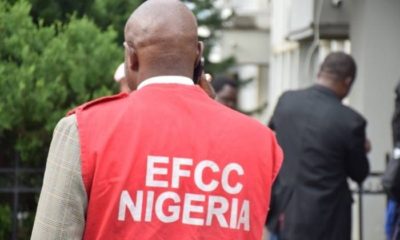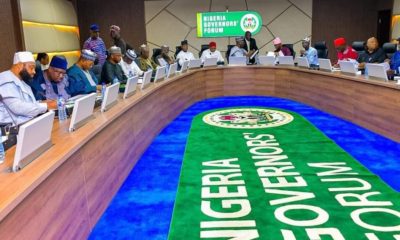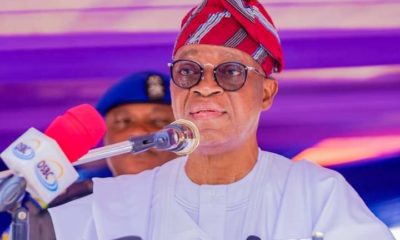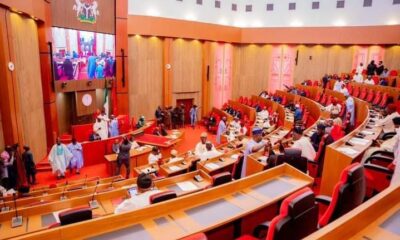Business
National Assembly Introduces Jail Terms For Ponzi Scheme Promoters
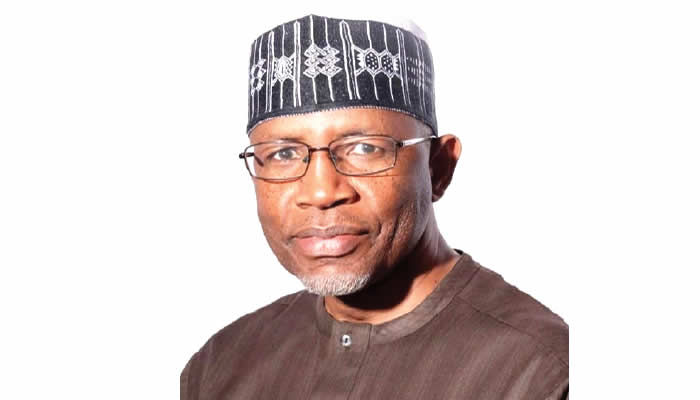
The Investment and Securities Bill, which might result in jail time for people who advocate Ponzi schemes in Nigeria has been passed by the National Assembly.
The Investment and Securities Service Bill 2023 finally scaled through the final hurdle of the National Assembly when the Senate passed it on March 29.
The bill, which is expected to aid the functioning of the capital market and facilitate the ongoing economic diversification in the country, had been passed by the House of Representatives in December. It is only awaiting presidential assent to become law.
At the plenary, the Senate President, Ahmad Lawan, stated that the bill is expected to protect investors, adequately regulate the market, reduce systemic risks as well as provide for more stringent punishment for operators of Ponzi schemes.
He said, “The bill for an act to repeal the Investments and Securities Act 2007 Act No. 29 2007 and enact the Investments and Securities Bill 2023 to service the SEC as the apex regulatory authority for the Nigerian capital market as well as regulation of the market to ensure capital formation, to protect investors, maintain fair, efficient and transparent market and reduction of systemic risk and for related matters is hereby passed.”
Speaking as of the time the House of Representatives passed the bill, the Chairman of the House Committee on Capital Markets and Institutions, Babangida Ibrahim, stated that the ISB 2023 was capable of transforming the capital market, attracting foreign investors as well as boosting investors’ confidence, among others.
Ibrahim said, “The bill seeks to repeal the existing Investments and Securities Act 2007 and to establish a new market infrastructure and wide-ranging system of regulation of investments and securities businesses in Nigeria, especially in the areas of derivatives, systematic risk management, financial market infrastructure and Ponzi scheme and platforms.”
One of the developments that the new bill brings is the prohibition of Ponzi/Pyramid schemes, which have led to the loss of billions of naira on the part of victims and also affected confidence in the investment climate in Nigeria.
The passed bill prohibits Ponzi/pyramid schemes as well as other illegal investment schemes and prescribes a jail term of not less than 10 years for promoters of such schemes.
Ponzi schemes, also known as pyramid sales schemes, are a money laundering system where investors are lured in with the promise of high returns on investment after a specified period.
The system runs in a somewhat cyclic fashion by paying old investors with deposits of new investors. Usually, this cycle becomes unsustainable when the backlog of old investors eligible for payments exceeds the investments coming into the system.
According to Nigeria’s Securities and Exchange Commission, three million Nigerians lost N18bn when the popular Ponzi scheme, Mavrodi Mundial Movement aka MMM, crashed in 2016. As of 2022, Nigerians have lost over N300bn in Ponzi schemes in five years, according to a report generated by the Norrenberger Financial Investments scheme.
The promoters of a popular investment scheme, Ovaioza Farm Produce Storage Business Limited, are facing prosecution for luring members of the public to an unregistered collective investment scheme. The promoters, Imu Yunusa and Goodness Omeiza have been accused of defrauding their victims up to N2bn.
Reacting to the introduction of the prohibition of Ponzi schemes, Chief Executive Officer of Enterprise Stockbrokers, Mr Rotimi Fakayejo, said that the move was long overdue and a welcome idea.
He said, “I remember very well, this Ponzi scheme that got a lot of people in trouble, MMM. In the end, it is not just about people losing money. It is the disinterestedness in investing. First, they invested in the wrong window and ultimately, they will not invest again.
“Some foolishly and gullibly invested in it and some because of ignorance entered into it and others because of greed. Those who entered into it because of greed know what they were doing, they are just greedy. But the ones who get into it ignorantly, not knowing that such schemes are not authorised by the SEC are the ones who may never enter into any viable or regulated investment window again. Every economy needs investment, for money to be revolving through profitable channels.”
Fakayejo also argued that both those who get involved in Ponzi schemes and their promoters should be punished, albeit, the sanctions would be different.
He said, “The person who goes into it should get a small punishment and the person that starts the scheme should get a huge penalty. For anything, you are supposed to make findings.”
Regarding the proposed jail term of not less than 10 years, Fakayejo stated that the inclusion of asset forfeiture and also a fine of 10-20 per cent of the amount of money collected from victims may not be a bad idea.
Expressing a divergent opinion on the Ponzi scheme prohibition, the National Chairman of the Progressives Shareholders Association of Nigeria, Boniface Okezie, stated that Ponzi schemes have been embraced in other places.
“The Ponzi scheme has worked elsewhere; people have embraced it but the Nigerian market has not embraced it and SEC said that it is not known to them and that it is a scam and so they cannot allow Nigerians to patronize it.”
Okezie also accused the National Assembly of copying foreign laws that may have little or no impact on the Nigerian scene and doubted that the President, Major General Muhammadu Buhari (retd) would sign the bill before the expiration of his tenure next month.
The PSAN boss said, “I do not think the outgoing president will assent to that bill before he leaves office on May 29 because previous bills sent to him, it took him time to assent, not to talk of now that he is going for retirement.”
Speaking on some highlights of the bill in a statement released after the Senate passed the bill, the Director-General of the Securities and Exchange Commission, Lamido Yuguda, said that a recommendation was made in the bill for the inclusion of the National Pension Commission on the SEC board for increased collaboration between the two agencies, particularly to encourage greater investment of pension funds and in capital market products/instruments.
This is a welcome development, according to stakeholders, given the visible role that pension funds play in the capital market already.
Capital market operator, Fakayejo, said that Pencom having a seat on the board of SEC was long overdue.
He said, “The pension funds have been a major investor in the capital market. Look at all the major instruments, either bonds or equities, commercial papers, at the different classes of bonds, whichever way you want to look at it, the pension funds are the largest investors. So, I believe they should have a say in how the market is being regulated.”
Okezie also agreed, saying that the pension funds had been a major player in the capital market.
He said, “The Pension Fund has contributed to a large extent to what are seeing today of the rallying in the capital market. If they are investing in the SEC-regulated market, they should be mindful of where they invest their money so that their money does not get trapped when they need to pay those retirees.”
Commenting on the bill being able to boost investors’ confidence and attract foreign investments like the Chairman of the House Committee on Capital Markets and Institutions, had boasted, Fakayejo, pointed out that the reasons foreign investors left and are leaving are still very much around.
He said the unstable exchange rate was a major deterrent for foreign investors.
“I don’t see anything in the bill that is a plus for foreign portfolio investment. You and I know that the reason they are not here or why they have taken away their money is the instability of the naira. That has been the basic reason they (FPIs) are not here.”
Professor Olawale Ajai of the Lagos Business School also agreed that the country’s business environment has not been investment-friendly.
Ajai said, “Insecurity and the opaque naira foreign exchange regime have not helped in recent times, in spite of strenuous efforts on ‘doing business reforms.’”
Others highlights of the bill include the expansion of the categories of issuers as a key step towards the introduction of innovations and offerings such as crowd-funding as well as the facilitation of “commercial and investment business activities”, subject to the approval of the commission and other stipulated controls.
The bill also expands the definition of a Collective Investment Scheme to include schemes offered privately to qualified investors, and contains an entirely new part which regulates Commodity Exchanges and Warehouse Receipts.
The SEC DG said that the new parts of the bill “are essential for developing the entire gamut of the Commodities ecosystem”.
According to him, a new part on the management of systemic risk has been introduced, covering the following themes: monitoring, management and mitigation of systemic risk in the Nigerian capital market; arrangements with other regulators relating to information required from entities that are regulated by other regulators; sharing of information between financial sector regulatory authorities or government agencies; and use of a legal entity identifier to provide for proper monitoring of systemic risks.
The proposed legislation categorizes Securities Exchanges as either composite or non-composite exchanges. A composite exchange allows for the listing and trading of all types of securities and products, whereas a non-composite exchange specializes in a single type of security or product.
Additionally, the bill expands the responsibilities of exchanges and outlines clear guidelines for revoking registration. It also introduces new provisions regarding Financial Market Infrastructures, such as Central Counter Parties, Clearing Houses, and Trade Depositories.
Business
ADF Flags Off N16Bn 2025 National Food Intervention Programme

Over one million Nigerians nationwide will receive a 10kg bag of rice each, with the Aliko Dangote Foundation (ADF) distributing the staple food as part of the 2025 Annual National Food Intervention Project.
The initiative, which commenced on Thursday would is estimated at a whooping cost of N16 billion.
During the flag-off of the nationwide distribution in Kano, Chairman of the Foundation, Alh Aliko Dangote, said the distribution of one million bags of 10kg rice to the poor and vulnerable Nigerians in the 774 Local Government Areas (LGA) in Nigeria was in line with the core values of his businesses and the ADF.
Dangote, who was represented by his daughter, Mariam Aliko Dangote said, “This annual initiative, which embodies compassion, solidarity, and shared responsibility, is part of our response to the current economic challenges facing our nation. It reflects our commitment to supporting our communities in line with our core values.”
ALSO READ: BREAKING: Rivers Chief Judge Under Probe For Alleged Age Falsification
He highlighted that the Foundation was kicking off the distribution in Kano State, after which it will proceed to other states, assuring that all arrangements are in place to ensure the food reaches those who need it most in all the LGAs of Nigeria.
Dangote, reputed to be Africa’s wealthiest person opined that food remains a basic human necessity, and this is why the ADF adopted the practice of embarking on a food distribution programme across Nigeria.
“We are collaborating with state governments to ensure that the food reaches the most vulnerable individuals in each state,” he added.
According to Dangote the ADF focuses on improving the living conditions of Nigerians through support for projects which tackle hunger and water supply problems, strengthen the quality and scope of health and education, and promote economic empowerment at the community level.
“Your excellency, I believe that today’s event will help in tackling hunger and helping the most vulnerable people in breaking their fast. We are playing our role in enhancing the living conditions of our people. I urge other industrialists and firms to lend a helping hand in combating hunger through programmes and initiatives that will place food on the tables of vulnerable Nigerians. This job should not be left to the government alone, rather we need a public private partnership that will help us in fighting the scourge.
“I commend the government at all levels for their efforts at addressing the food crisis. I am certain that with time, we shall overcome these challenges, therefore let us support the government to achieve its target of a better life for Nigerians, “he said.
On his part, Kano State Governor, Abba K. Yusuf, who flagged off the National Food Intervention Programme commended the good gesture and said the intervention reflects the unwavering commitment of Alh Dangote in addressing poverty and hunger in Nigeria.
The Governor, who was represented by his Deputy, Comrade Aminu Abdulsalam Gworzo said 120,000 bags of 10kg rice will be distributed across the 44 Local Government Areas of the state.
He described Alh Dangote as humane, adding that: “A similar event took place last year where he personally oversaw the distribution of food stuff to the poor in this very arena.”
To ensure transparency in the distribution process, he said the state government has set up a committee comprising of relevant ministries, CSOs, religious leaders, departments and agencies, local authorities, the Hisbah Board and security agencies.
Managing Director and Chief Executive Officer of the Aliko Dangote Foundation, Zouera Youssoufou, said the Annual National Food Intervention Project is a way of giving back, and supporting governments in fighting poverty and hunger in Nigeria.
She said that Alh Dangote is passionate about philanthropy and committed to ensuring that hunger is wiped out or reduced to the minimum in Nigeria.
“We are going to other states to distribute the products, but we’ve just flagged off in Kano,” she told newsmen on the sideline of the Kano Government House, venue of the flag off.
The Deputy Commander-General of Hisbah Board in Kano, Dr. Mujahid Aminudeen, thanked the ADF for the initiative, urging more Nigerians to emulate Alh Dangote in the humanitarian cause.
He said the Hisbah Board will ensure that the products reach the targeted beneficiaries.
One of the beneficiaries, Ibrahim Ahmed, speaking on behalf of others thanked Alh Dangote for his large heart saying the gift would go a long way in reducing food pressures on them especially during the Ramadan while also praying God to continue to help him in his businesses.
Recall that the ADF has been at the forefront of tackling and ameliorating the impact of natural disasters and health challenges in Nigeria and the rest of the world.
The ADF donated N153million to boost Nigeria’s fight against Ebola Virus Disease in 2014, $3million to the African Union (AU) to help combat the scourge, and N66.66 million to install thermal scanning systems and cameras at Nigeria’s 4 international airports.
During the COVID-19 pandemic, we donated N2billion to the CACOVID Fund, a Private Sector task force in partnership with the Federal Government, the Nigeria Centre for Disease Control (NCDC) and the World Health Organisation (WHO) with the sole aim of combating Coronavirus (COVID-19) in Nigeria.
In support for education, we donated a N1.2bn modern business school edifice to the Bayero University, Kano, a fully equipped 2,160-bed capacity hostel complex to the Ahmadu Bello University, Zaria and a N300 million building to University of Ibadan Business School.
Beyond the shores of Nigeria, the ADF has also recorded milestones with a donation of $1million, to lift victims of two earthquakes that devastated Nepal.
Business
Lawmakers Call For Immediate Reversal Of ATM Fee Increase

The Central Bank of Nigeria (CBN) is under pressure to suspend its recently introduced increase in Automated Teller Machine (ATM) transaction charges due to the country’s worsening economic conditions.
During Tuesday’s plenary session, Marcus Onobun, a lawmaker representing Esan Central/Esan West/Igueben Federal Constituency in Edo State, raised concerns over the policy through a motion of urgent public importance.
He noted that the CBN’s directive not only increases withdrawal fees but also removes free ATM transactions for customers using other banks’ machines, adding to the financial strain on Nigerians.
SEE ALSO: Direct CBN To Suspend ATM Fee Hike Pending Court Verdict, SERAP Tells Tinubu
According to the new regulations, customers withdrawing from their own bank’s ATMs will still enjoy free withdrawals.
However, those using other banks’ ATMs will now be charged N100 for withdrawals of N20,000 within a bank’s premises. At off-site ATMs, such as those in shopping malls or markets, the charge remains N100, but with an added N500 surcharge.
Onobun, a member of the Peoples Democratic Party (PDP), argued that Nigerians are already struggling with economic difficulties, including high inflation, rising fuel costs, increased electricity tariffs, and multiple banking fees.
He warned that the additional charges could further discourage financial inclusion, particularly among low-income earners, contradicting the CBN’s own agenda.
“The banking sector continues to record significant profits, yet customers are being burdened with more charges without any improvement in service delivery or infrastructure. This is unfair and unacceptable,” he stated.
Following his motion, Speaker Tajudeen Abbas put the matter to a voice vote, and lawmakers overwhelmingly supported it.
As a result, the House of Representatives called on the CBN to immediately halt the implementation of the policy until further consultations are held with relevant banking and finance committees.
Business
NNPC Ltd Clarifies Naira-Crude Contract With Dangote Refinery

The Nigerian National Petroleum Company Limited (NNPC Ltd) is already emplacing an new naira for crude contract with the Dangote Petroleum Refinery and Petrochemicals, because the initial contract was for six months which expired in March 2025.
This clarification was made in a statement in Abuja by the Chief Corporate Communications Officer, NNPC Ltd, Olufemi Soneye on Monday.
ALSO READ: Naira-For-Crude Policy Still-In-Force – Chairman, Technical Sub-Committee
According to Soneye, the NNPC Limited has noted recent reports circulating on social media regarding the alleged unilateral termination of the crude oil sales agreement in Naira between NNPC Ltd. and Dangote Refinery.
To clarify, the contract for the sale of crude oil in Naira was structured as a six-month agreement, subject to availability, and expires at the end of March 2025. Discussions are currently ongoing towards emplacing a new contract.
Under this arrangement, NNPC Ltd. has made over 48 million barrels of crude oil available to Dangote Refinery since October 2024. In aggregate, NNPC Ltd. has made over 84 million barrels of crude oil available to the Refinery since its commencement of operations in 2023.
NNPC Limited remains committed to supplying crude oil for local refining based on mutually agreed terms and conditions.



